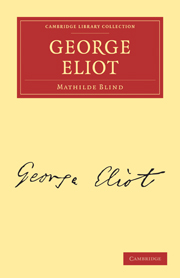Book contents
- Frontmatter
- PREFATORY NOTE
- Contents
- CHAPTER I INTRODUCTORY
- CHAPTER II CHILDHOOD AND EARLY HOME
- CHAPTER III YOUTHFUL STUDIES AND FRIENDSHIPS
- CHAPTER IV TRANSLATION OF STRAUSS AND FEUERBACH — TOUR ON THE CONTINENT
- CHAPTER V THE “WESTMINSTER REVIEW”
- CHAPTER VI GEORGE HENRY LEWES
- CHAPTER VII SCENES OF CLERICAL LIFE
- CHAPTER VIII ADAM BEDE
- CHAPTER IX THE MILL ON THE FLOSS
- CHAPTER X SILAS MARNER
- CHAPTER XI ROMOLA
- CHAPTER XII HER POEMS
- CHAPTER XIII FELIX HOLT AND MIDDLEMARCH
- CHAPTER XIV DANIEL DERONDA
- CHAPTER XV LAST YEARS
- THE PROPHECY OF SAINT ORAN: AND OTHER POEMS
CHAPTER XI - ROMOLA
Published online by Cambridge University Press: 07 September 2011
- Frontmatter
- PREFATORY NOTE
- Contents
- CHAPTER I INTRODUCTORY
- CHAPTER II CHILDHOOD AND EARLY HOME
- CHAPTER III YOUTHFUL STUDIES AND FRIENDSHIPS
- CHAPTER IV TRANSLATION OF STRAUSS AND FEUERBACH — TOUR ON THE CONTINENT
- CHAPTER V THE “WESTMINSTER REVIEW”
- CHAPTER VI GEORGE HENRY LEWES
- CHAPTER VII SCENES OF CLERICAL LIFE
- CHAPTER VIII ADAM BEDE
- CHAPTER IX THE MILL ON THE FLOSS
- CHAPTER X SILAS MARNER
- CHAPTER XI ROMOLA
- CHAPTER XII HER POEMS
- CHAPTER XIII FELIX HOLT AND MIDDLEMARCH
- CHAPTER XIV DANIEL DERONDA
- CHAPTER XV LAST YEARS
- THE PROPHECY OF SAINT ORAN: AND OTHER POEMS
Summary
‘Romola’ marks a new departure in George Eliot's literary career. From the present she turned to the past, from the native to the foreign, from the domestic to the historical. Yet in thus shifting her subject-matter, she did not alter the strongly-pronounced tendencies underlying her earlier novels; there was more of spontaneous, humorous description of life in the latter, whereas in ‘Romola’ the ethical teaching which forms so prominent a feature of George Eliot's art, though the same in essence, was more distinctly wrought out. Touching on this very point, she observes in a letter to an American correspondent: “It is perhaps less irrelevant to say, apropos of a distinction you seem to make between my earlier and later works, that though I trust there is some growth in my appreciation of others and in my self-distrust, there has been no change in the point of view from which I regard our life since I wrote my first fiction, the ‘Scenes of Clerical Life.’ Any apparent change of spirit must be due to something of which I am unconscious. The principles which are at the root of my effort to paint Dinah Morris are equally at the root of my effort to paint Mordecai.”
The first section of ‘Romola’ appeared in the Cornhill Magazine for the summer of 1862, and, running its course in that popular periodical, was finished in the summer of the following year.
- Type
- Chapter
- Information
- George Eliot , pp. 148 - 160Publisher: Cambridge University PressPrint publication year: 2010First published in: 1883

